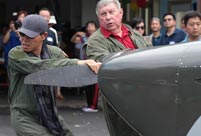

HANGZHOU, Sept. 3 -- As the presidents of the world's two biggest economies concluded their eighth meeting in three years, the breadth and depth of one of the world's most vital relationships are steadily expanding.
Chinese President Xi Jinping and U.S. President Barack Obama, on the eve of the G20 summit in Hangzhou, agreed that the two countries will deepen mutual trust and collaboration, and manage and control their differences in a constructive manner to push forward continuous, sound and stable development of bilateral ties.
Three years ago, the two leaders took a stroll in their shirtsleeves in the Sunnylands estate in California, reaching a historic consensus on a new model of major-power relationship featuring no conflict, no confrontation, mutual respect and win-win cooperation.
The complicated U.S.-China relationship has not always been bathed in sunshine, sometimes it is obscured by storm clouds. This major-power relationship is more than a rhetorical flourish, it is heavy with significance.
Sino-U.S. relations have facilitated numerous notable accords.
While structural and ideological differences remain, business is the bridge that links the two countries. China overtook Canada, the United States' closest neighbor and ally, to become its biggest trading partner in 2015. Chinese investment surged in the United States, and the two are negotiating a bilateral investment treaty, likely to boost business ties to new highs.
Behind the encouraging trade figures are millions of jobs created in both territories that benefit the two peoples.
People-to-people exchanges have been boosted thanks, in part, to the expansion of tourist visas from one year to ten years. The White House estimates that up to 440,000 American jobs will be created by 2021 because of the increased tourism and business spurred by the visa policy.
The two countries have also been active in the brokering of nuclear deals in the Korea Peninsula and Iran, showing them to be staunch forces in the overall protection of regional peace and stability.
However, the Sino-U.S. relationship is not without its thorny issues.
Cyber security, Taiwan and Tibet issues and human rights flare up from time to time, putting strain on the relationship. The South China Sea issue and U.S. deployment of anti-missile system in the Republic of Korea rocked the boat of regional stability.
While there are areas where the two nations may not see eye-to-eye, it is easy to lose sight of the larger arc of progress in the relationship. Both China and the United States have benefited enormously from opening up to and integrating with each other. Both have an enormous stake in each other's economic success.
As Scott Kennedy, deputy director of the Freeman chair in China studies at the Center of Strategic & International Studies, Washington, said that increasing the depth, breadth and frequency of engagement with the Chinese government was an important Obama legacy.
Through phone calls, letters, scripted and unscripted candid talks between the two leaders, the two countries have avoided precipitous decline in their relationship and are moving their vital and complicated ties forward.
More importantly, they have enhanced the way in which they cooperate when they can, and directly address their differences when they can not.
After the two presidents left their historic footprints in Sunnylands, Zhongnanhai and the White House, the two shook hands in Hangzhou where the negotiations for the first China-U.S. joint communique in 1972 was held.
What is past is prologue. Leaders of the two countries had broken the ice and ushered in a new era of bilateral ties. Maximizing cooperation in areas of mutual interest while confronting and managing disagreements is the desirable way for the two very big - but very different countries - to get along.
In this way, they can become a bedrock of global stability and drivers of world peace.
 Shenzhen seizes 549 tons of illegally smuggled clothing
Shenzhen seizes 549 tons of illegally smuggled clothing Chinese actor Wang Baoqiang divorces wife, fires manager
Chinese actor Wang Baoqiang divorces wife, fires manager New hovercrafts debut in landing exercise
New hovercrafts debut in landing exercise Home-made plane completes test flight in Chicago
Home-made plane completes test flight in Chicago Huangluo: China's 'long hair village'
Huangluo: China's 'long hair village' Spectacular bridge with one of the tallest piers in the world
Spectacular bridge with one of the tallest piers in the world Magnificent view of Hukou Waterfall
Magnificent view of Hukou Waterfall Woman sets Guinness World Record with 17-month-long pregnancy
Woman sets Guinness World Record with 17-month-long pregnancy A glimpse of Stride 2016 Zhurihe B military drill
A glimpse of Stride 2016 Zhurihe B military drill Top 10 livable Chinese cities
Top 10 livable Chinese cities Top 20 hottest women in the world in 2014
Top 20 hottest women in the world in 2014 Top 10 hardest languages to learn
Top 10 hardest languages to learn China’s Top 10 Unique Bridges, Highways and Roads
China’s Top 10 Unique Bridges, Highways and Roads Australia’s security paranoia baffles China
Australia’s security paranoia baffles China
 Big love can come in small packages
Big love can come in small packages
 As traditional family lifestyle breaks down, more youngsters are living solo than ever before
As traditional family lifestyle breaks down, more youngsters are living solo than ever before
 Foreigners spice up Chinese instant noodle recipes with unique ingredients, concocting new and interesting flavor creations
Foreigners spice up Chinese instant noodle recipes with unique ingredients, concocting new and interesting flavor creations
Day|Week